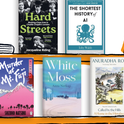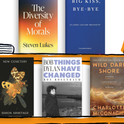The Political Thought of Xi Jinping
by Steve Tsang & Olivia Cheung (Oxford UP, £22.99)
In 2019, the propaganda arm of the Chinese Communist Party released an app called “Xuexi Qiangguo,” or “Study the Great Power”. The purpose of this app—as Steve Tsang and Olivia Cheung describe in their illuminating account of Chinese leader Xi Jinping’s thought and its many uses—was to promote and facilitate the study of the great leader’s ideas. Downloading it became compulsory for civil servants, party members, teachers and employees of state-owned enterprises. Once installed, the app reports back on how often and for how long it is in use. Slacking will be noted.
Fortunately for the reader, Tsang and Cheung’s account of the development and deployment of Xi’s doctrine—“Xi Jinping Thought on Socialism with Chinese Characteristics for a New Era”, to give it its full, snappy title—provides an informative alternative for readers who are able to resist the allure of the app. They offer an essential guide to such mysteries as the “10 Making Clears”, the “Two Upholds” and the “Four Comprehensives”, along with the ideology that underpins Xi’s promise of both rejuvenation at home and influence abroad.
Xi’s thought is now on the Chinese curriculum from kindergarten to university, blasted out through public loudspeakers, embedded in the party constitution and translated into several languages to satisfy international demand. It is also reshaping China, so more than a nodding acquaintance with the canon is essential to understanding where the People’s Republic is headed.
Xi is a convinced Leninist who regards the collapse of the USSR as a global tragedy. His own contribution to history, according to the authors, is a form of Sino-centric consultative Leninism. (Why “consultative? In the authors’ formulation, “It is about the Party’s providing more scope to solicit input from the society and cadres in order to uphold the Party’s power monopoly.”) It might not be what Karl Marx imagined, but it will be with us for the foreseeable future.
Isabel Hilton
How Life Works: A User’s Guide to the New Biology
by Philip Ball (Picador, £22)
In 1953, Francis Crick burst into the Eagle pub in Cambridge to declare that he had found the “secret of life”—by decoding the famous double-helix structure that composes the DNA molecule.
Or, rather, he didn’t. One of his co-discoverers, James Watson, admitted in 2017 that the scene had been invented, but the principle still stood: DNA, the molecule built from genes, was the secret of life. Decades later, announcing the completion of the Human Genome Project—the task to map all our genes—Bill Clinton claimed that it was “the language in which God created life.”
The idea of the genome as a blueprint has been a pervasive one, but in the past two decades it has lost its charm. Life is more—much more—and it seems to emerge not from any one place, nor have a singular “secret” to be discovered.
The science writer (and Prospect contributor) Philip Ball wants to recalibrate the story of biology along these lines. In his How Life Works, he writes that only now can we tell a better story of life—and glimpse what make it cohere. He adds that the narrative we ought to be telling about how life works has shifted over the past several decades, and it is time we said so.
Ball deftly explains how it’s possible to follow, in exquisite detail, how cells develop and specialise to form an organism. We are revising life constantly, and Ball’s account of synthetic biology takes us to this exciting frontier.
The prose is often dense, however, to the point that the book should be regarded as more a textbook than something for the lay reader. Though for anyone who perseveres, there are many nuggets between its covers. Thanks to modern science, life will never be the same again.
David Whitehouse
Comic Book Punks: How a Generation of Brits Reinvented Pop Culture
by Karl Stock (Rebellion, £24.99)
Popular culture is a swirling, ungraspable thing. Influences blend with other influences, important trends with fleeting fads, such that it’s hard to tell the true beginnings of anything—or what truly matters.
Yet there are some handholds: points of certainty amid the confusion on to which we can grab, and say, this—this!—really was the start of something big. In Comic Book Punks, Karl Stock has reached for a fine example: the British comic-book artists, writers and editors of the late 20th century whose influence spread well beyond their own medium to define much of the culture that we encounter today.
Who were they? To start off with, they were invisible. They were professional odd bods who grew up on scavenged American comics after the war and then brought their fanaticism to Fleet Street in the 1960s and 1970s. They worked, mostly uncredited, on titles that sold in the hundreds of thousands—Tammy, Action and, eventually, the great sci-fi weekly 2000AD—when not shuffling between pubs and proto-conventions.
Stock illuminates this underground world with a mixture of research—he’s clearly spoken to everyone who’s able to talk—and wit. The writing has a nicely conversational tone, though not one that diminishes the force of its points.
And the main point is perhaps this: comic-book creators may be less invisible now—in the sense that their work has gone mainstream and they’re credited for it—but they’re still not quite fully seen. When we encounter multiverses in the Marvel Cinematic Universe, do we pay homage to their greatest exponent, Grant Morrison? Do we thank the brilliant Garth Ennis for helping the medium laugh at itself? Is even Alan Moore’s impact on modern culture—and not just with Watchmen—genuinely appreciated?
The answer, in all cases, is no, not enough. Comic Book Punks is an enjoyable corrective.
Peter Hoskin
Day
by Michael Cunningham (Fourth Estate, £16.99)
Like his Pulitzer prize-winning novel The Hours, the American writer Michael Cunningham’s latest, Day, is a story in three acts. Unlike The Hours, though, where each section introduces us to different characters, settings and time periods— from 1920s London to New York City in 1999—both the cast and scope of Day are much more compact. Each section concerns the lives of the same characters—a small, close-knit group of family and friends, all originally living in New York—as we meet them on 5th April for three successive years: 2019, 2020 and 2021, on the morning of the first day, the afternoon of the second and the evening of the third.
Yes, this is Cunningham’s Covid novel. Not that the disease is ever actually named, though it is omnipresent. It is an encroaching shadow in the first section. By the middle section, everyone’s in lockdown and falling sick. The final section portrays the aftermath—what has and hasn’t changed.
Cunningham writes in the close third-person, paying intimate attention to every emotional shift in his characters’ hearts and minds. The first part is a bravura exercise in both elegance and precision as he dances through the entangled lives of his main players: Isabel and Dan and their kids, 10-year-old Nathan and five-year-old Violet, along with Isabel’s beloved brother, Robbie, a single gay man who, much to the entire family’s upset, is about to move out of the attic of the couple’s Brooklyn brownstone.
This graceful flow does, I’m afraid to say, falter slightly in the second part, which is largely rendered in surprisingly clunkily penned letters, but then Cunningham knits it back together in the final act. It’s perhaps not his best work, but there’s still enchantment in the prose.
Lucy Scholes
Green Dot
by Madeleine Grey (Weidenfeld & Nicolson, £18.99)
Hera—a 24-year-old with “three variations of arts degrees”—credits her lack of a career to a form of ennui. It’s not just a lack of ambition, but a desire to retreat from the world: to not be one of the many commuters on public transport; one of the many sitting in glass offices; one of the many whose lives, however limited, are moving forward. At some point, this has to change—and Hera gets a job as an “online community moderator” at a Sydney newspaper.
Here she meets Arthur, a journalist some two decades older than her. A flirtation follows, and, after they sleep together one drunken evening, he confesses he is married.
The title of Green Dot—Madeleine Gray’s debut novel—refers to the circle that reveals whether a messenger is “online”. The story is propelled by online communication: from the first weeks of flirtation to the hours that Hera spends waiting to hear from Arthur.
Green Dot occasionally seems mired in its own stagnation. Hera is a depressive character, obsessed with her intelligence and her romantic failings; a mash-up of Holden Caulfield’s cynicism and Bridget Jones’s self-pity. But it’s also a study of obsession, of the lies people tell themselves in love, and the tropes of an “affair novel”. (“For not one moment of this relationship,” narrates Hera at the start, “was I unaware of what every single popular culture representation of such an arrangement portended my fate to be.”)
Beyond the love-plot, Green Dot is a subtle exploration of what it means to be young—with every conceivable privilege—and still be depressed; to live in a world that seems to promise so little.
Francesca Peacock












